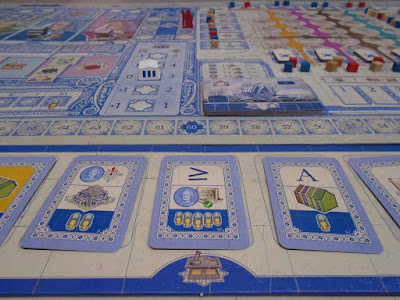LISBOA
a review of the board game Designed by Vital Lacerda
Players: 1-4, Time Investment: 60-120 mins
Rating:
Players: 1-4, Time Investment: 60-120 mins
Rating:
Game Aesthetic
Components
With the exception of the Officials meeples and the player mat, the physical components in this game are pretty standard. Though I do have to say, having a big chunk of cardboard coins to represent higher denominations is a fun touch.
 |
| Stores and Officials: Ready to Deploy! |
Artwork by Ian O'Toole:
This is where I start gushing. The use of shadowing in the art of this game gives it the depth and ornamentation often seen in palaces or buildings of importance -- which is a good fit considering the activities undertaken in the game. Unsure if this was intentional, but the colors associated to each of the Nobles is appropriate: Pink, for the hoity toity king; Blue, for the serious minister; and Green, for the economically-oriented builder. Having the Cardinal pass through the cathedral round and round is fitting. The background of the main game board ties in with the aftermath of the earthquake as well. Overall, the art is classic and dives headfirst into the period. |
| Welcome to The Royal Court! |
 |
| Trade with the King and Meet the Cardinal |
The First Turn
Options:
Now for the part that earned this game a Blubbering rating.Although the rules summary says you just do one of four things... that's a LOADED statement right there. It says,
Choose One:
1. Play Any Card into your Portfolio, and Sell Goods or Trade with the Nobles then Take a new card.
2. Play a Noble Card to the Royal Court, Spend Influence, Visit a Noble, then Take a new card.
3. Play a Treasury Card to the Royal Court, Pay Treasury value, Sponsor an Event, then Take a new card.
4. Discard any card, Take a Gold, then Take a new card.
Simple right? WRONG, there are absolutely benefits to doing a little of everything.
Starting goods are given to all players to help aid the first turn but that benefit goes away quickly. So you could gain goods from stores, which are used -- among other things -- for trading with Nobles to do 1-2 actions. Note that circular dependencies occur left and right for goods and encouraging diversity. Even more so, Sold Goods are required to be exported on all existing ships with room, not just your own. So if you're producing without giving yourself a way to benefit off your own goods, you're handing points to your opponents!
Just when you thought you had it all, resource limits in your portfolio force you to teeter totter and monitor your own personal wealth since accumulating for the sake of accumulating is discouraged in this game. Consequently, you must spend wisely! Limits exist on cards to play to your personal mat as well, so order and timing is everything.
 |
| Welcome to your Portfolio! |
All in all, lots of give and take, balancing and sensitivity to synergy exists but hard to see on your first turn.
My favorite page in the player aid -- yes, PAGE as in THERE IS MORE THAN ONE PAGE -- is the "How To" to solve in game issues instead of constantly checking the rule book or the person teaching the game on "How do you get [insert resource here] again?"
The first turn, with your starting resources, you can say "I have money!" then "I built a store!" and then... "Oh. Now what."
Selling goods offers in game points but do you want to sell what you have? Fun fact: Production of goods crash the market. So good luck selling for cash at a premium over time.
 |
| Sell Goods based on the Market Track |
Bogging down your Portfolio (the name for your personal mat area) with treasury cards can give some momentary relief but over time the return isn't that great as this takes up space for other things like ships.
Noticing things as you go, like "Oh I should have seen that. Ooops" often happens, especially when reviewing the points from situating your stores on specific streets.
 |
| On which street will you set up your store? |
There are very few ways to gain influence when it is required for payment at the Royal Court. If you're not influential enough, you'll pay with points. Ouch.
So you think, hey, I'll just build a ship.
 |
| Trade with the Minister to Build or Upgrade a Ship |
Do you have goods? Uh. No. Cool story, bro.
Okay fine, I'll go ahead and grab some benefits from the church. Have you visited the King? No, I can't right now. Cool story, bro.
Well dammit fine, I'll just tuck some things into my portfolio. What's your capacity? Not enough. COOL. STORY.
Okay okay, how do I get more space in my portfolio? Well, you need rubble.
 |
| Rubble, Rubble, toil and trouble! |
How do I get rubble? Public building or store. Oh! Really? Sure, do you have money and officials in court? Uh. No. COOL STORY BRO OMG
 |
| Trade with the Builder for a Plan or Visit the King to Open a Public Building |
After the first period ends, you finally feel like things are happening for you. No worries, you only have one more period to wrap up your master plan. That's all the time in the world! #sarcasm
 |
| Your turn is over! But will you take a Noble card or a Treasury card next? |
Rewards and Objectives:
Take a Decree is a prediction on how you will do at the end of the game for some varied amount of points. Some are harder than others and almost always require planning ahead. This being said, it is entirely likely that someone can deny you if they feel you are in the lead.
After that, you are at the mercy of planning towards the standard Endgame Scoring, which entails:
how big the Ships in your portfolio are,
which were acquired with goods which were typically acquired from building a Store,
which required réis...
completed sets of Rubble,
which were acquired with building stores,
which required réis...
having more stores of a specific type than your opponents
cashing out your influence,
which you may have been spending on Visiting a Noble or Following an opponent's Visit...
a 1:5 ratio of wigs to réis,
which you may have been spending on building already
having more officials involved in Public Buildings than your opponents
then finally
a 2:1 ratio of wigs to Royal Favor tiles,
which you may have been spending on following visits already
ARGH!!
 |
| Visit the Minister and Take a Decree |
how big the Ships in your portfolio are,
which were acquired with goods which were typically acquired from building a Store,
which required réis...
completed sets of Rubble,
which were acquired with building stores,
which required réis...
having more stores of a specific type than your opponents
cashing out your influence,
which you may have been spending on Visiting a Noble or Following an opponent's Visit...
a 1:5 ratio of wigs to réis,
which you may have been spending on building already
having more officials involved in Public Buildings than your opponents
then finally
a 2:1 ratio of wigs to Royal Favor tiles,
which you may have been spending on following visits already
ARGH!!
Ability to Pivot:
There are not many ways to pivot in this game. Sure, if you see your opponents doing things you may want to not do those things because there is a degree of scarcity here. Other than that, pivoting of your own accord and free will isn't clear. Everything you do is interconnected, and everything your opponents do also add that element of lack of control when evaluating your options for setting up stores or visiting the court.Game End
As if you didn't have enough to worry about, there are only two periods in this game, with periods marked as either 2 sets of rubble completed or 3 decks from the Noble and Treasury card display are empty. So the game can go as fast or as slow as the players collectively push or pull. There's a relatively good chance you'll know how many turns you have left but since the stress is more on the immediate future, you may feel taken aback and wish you had done things differently. This is the beauty of the game and will keep you coming back for more.



No comments:
Post a Comment
Shed some tears with me!